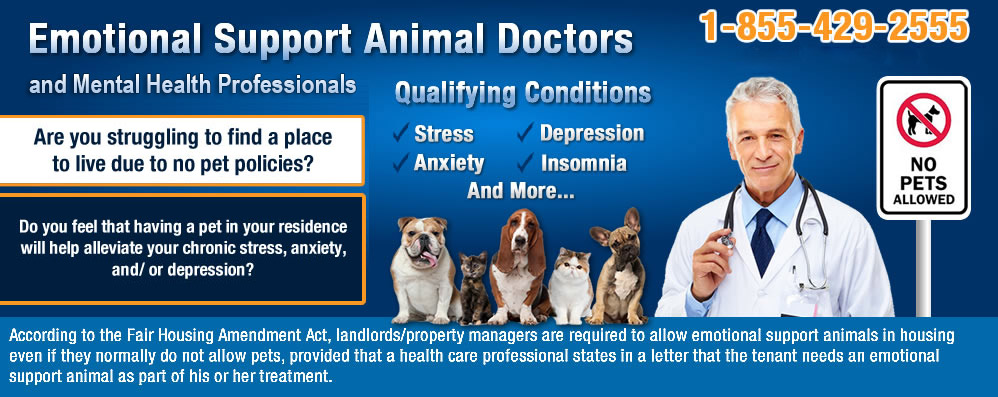Contents
- 1 Laws Governing Emotional Support Animals
- 1.1 The Fair Housing Amendments Act
- 1.1.1 Types of Housing That Do Not Have to Accept ESAs
- 1.1.2 How Does The Landlord Determine ESA Eligibility?
- 1.1.3 Will My ESA Be Restricted to My Residence?
- 1.1.4 Can a Property Manager/Landlord Deny My Request for Reasonable Accommodation?
- 1.1.5 What If the Property Owner/Landlord Refuses to Make Reasonable Accommodations?
- 1.2 The Air Carriers Access Act (ACAA)
- 1.3 How Do I Get an ESA Letter for Housing and Airline Travel?
- 1.1 The Fair Housing Amendments Act
Laws Governing Emotional Support Animals
There are two emotional support animal laws: the Air Carriers Access Act (ACAA) and the Fair Housing Act (FHA).
The Fair Housing Amendments Act
(FHAct, 42 U.S.C.A. 3601 et seq.)
The FHA, requires housing communities and apartments that have policies restricting pets to make “reasonable accommodation” for emotional support animals (ESAs). Basically this means that ESA owners with a proper ESA letter written by a licensed mental health professional cannot be denied housing.
Property owners/landlords also cannot:
- charge a verified ESA owner an advance deposit or fees for ESAs (even if resident pet owners are charged)
- Inquire about the extent of a verified ESA owner’s disability, or ask for detailed medical records
- impose breed, size and/or weight limitations for your ESA
- require that your ESA animal performs a certain task (like a service animal)
- require that your ESA wear emotional support animal identification, such as a vest or ID tag
Types of Housing That Do Not Have to Accept ESAs
Landlords/property owners can deny an emotional support animal if the property is:
- a building with four or less units with one of the units occupied by the landlord
- a private club
- single-family housing sold or rented without a real estate broker
How Does The Landlord Determine ESA Eligibility?
There are two questions a housing provider must consider when a request for reasonable accommodation is made:
- Does the person seeking to use and live with the animal have a disability?
- Does the person making the request have a disability-related need for an assistance animal?
If you have a proper ESA letter, both those questions must be answered, “Yes.” And if “Yes” is the answer to both questions, then the property owner/landlord must provide reasonable accommodation for your ESA.
Will My ESA Be Restricted to My Residence?
No, your ESA is allowed in all areas where people are normally allowed to go, unless doing so would impose an undue financial and administrative burden or would fundamentally change the nature of the housing provider’s services. Access would typically include your residence and tenant common areas.
Can a Property Manager/Landlord Deny My Request for Reasonable Accommodation?
Yes. Your request for reasonable accommodation can be denied if your emotional support animal:
- poses a direct threat to the safety or health of others and that threat that cannot be reduced or eliminated by another reasonable accommodation.
- would cause significant physical damage to the property of others and that damage cannot be reduced or eliminated by another reasonable accommodation.
These determinations cannot be made on speculation, but must be based on objective evidence about a specific ESA’s actual conduct.
That being said, you must properly control your ESA. If your ESA damages the property you might be required to pay for it and lose your ESA privileges. You might also lose your privileges if your ESA poses a health or safety threat.
What If the Property Owner/Landlord Refuses to Make Reasonable Accommodations?
If your request for a reasonable accommodation is denied by the landlord, you can file a discrimination complaint with HUD (the Department of Housing and Urban Development), the agency that oversees the FHA and investigates claims of housing discrimination.
If your state has a government agency that investigates discrimination claims, you can also file a complaint directly with that agency.
The Air Carriers Access Act (ACAA)
Signed in 1986, the ACAA, along with Department of Transportation rules, works to prohibit the discrimination of disabled individuals traveling by air. According to ACAA provisions, airlines are not allowed to refuse transportation, limit, or require advanced notice before offering service to individuals who are disabled.
That being said, airlines may require advanced notice for certain accommodations — such as electric wheelchairs or medical equipment — and may require notice for ESAs, depending on the individual airline guidelines.
What You Need to Have Your ESA Fly In-Cabin on Commercial Airlines
In order to be covered by the ACAA and comply with airline regulations so your ESA can fly in-cabin with you, you will need a proper ESA letter that is not dated more than 1 year from the date of your scheduled flight.
Along with standard ESA letter requirements — such as being written and signed by a licensed mental health care professional — the ESA letter should indicate that you need your emotional support or support animal as an accommodation for air travel and/or for activity at your destination.
With your ESA letter, airlines are not legally allowed to ask questions about your disability or to charge you fees for accommodating your emotional support animal. Traveling with an ESA, however, does have certain rules and requirements and takes some advanced planning, such as:
- A valid ESA travel letter is always required when traveling with your emotional support animal, but there may be other forms that might be required by the specific airline you are flying.
- Most airlines want the travel documents and any other arrangements at least 48-hours before the flight.
- Airlines require your emotional support animal to be well behaved in public and calm on the plane.
- Airlines will not allow your ESA to block a space that, for safety reasons, must remain unobstructed, such as access to an emergency exit.
- Airlines are not required to upgrade you to a different class of service to accommodate your ESA. However, upon request, an airline might be able to switch you to a bulkhead seat that might have more room for your ESA.
Are There Other Requirements?
Every airline has different policies regarding emotional support animals. Many require additional forms — such as a veterinary health form — that must be completed and signed. It is important to check specific airline policies before making reservation. Policies might include not being able to sit in an exit row or limiting the type of ESA that can accompany you in-cabin.
For example, here is a quick look at portions of policies from a few major airlines:
- Alaska Air: Documents must be provided at least 48 hours before your scheduled departure time.
- American Airlines: Your ESA must be able to fit your lap, at your feet or under your seat.
- Delta Air Lines: You are limited to 1 ESA per customer per flight.
- Jet Blue: The only acceptable ESAs are dogs, cats and miniature horses.
- Southwest: The airline reserves the right to deem any exotic ESA suitable or not suitable for in-cabin travel.
- United: Your ESA must be well-behaved and pose no risk or disturbance to the other passengers.
These are only representative samples, not complete policies. These examples and the full policy should be confirmed directly with the airline.
Before you fly, double-check that you have provided required materials within the designated time frame and that you have, with you at the airport, the materials you need to board the plane with your ESA.
What If I Encounter a Problem?
If you think that your rights under the ACAA are being violated or have been violated, ask to speak with a Complaints Resolution Official (CRO). Every airline has an a CRO as its expert on disability accommodation issues and airlines are required to make one available to you, at no cost. There will either be a CRO available in person at the airport or via telephone during the times the airline is operating.
Does my ESA Need to Wear an ESA Vest When Traveling by Air?
Unless that is a specific requirement of the airline you are flying, no. Your ESA letter should be identification enough.
When traveling, some people like to have their emotional support animal have wearable ID, such as a vest or ID tag. They feel that it helps explain the presence of an animal in the airport or on the airplane, positioning your ESA as a “working animal” to airport and airline personnel and passengers.
What About Flying Internationally?
Emotional support animals can fly on the majority of international flights that originate in the United States. As long as the airline goes to and from the USA, your ESA letter will be valid on the flight. Be aware that many foreign airlines operating to and from the US only accept dogs as ESAs.
Check with the airlines regarding possible restrictions and/or fees imposed by destination countries for legal entry and exit for animals.
What Happens When I Get to My Destination?
Be aware that hotels, motels and temporary lodging are not required by either the ACAA or FHA to accept your emotional support animal; your ESA will typically be treated like an ordinary pet. When traveling, if you are planning on a hotel stay, call ahead to find a hotel with a pet policy that fits your needs.
Hotels that do allow pets might require an additional deposit or payment and/or have other policies that must be followed.
How Do I Get an ESA Letter for Housing and Airline Travel?
For protection under the FHA and ACAA, you must have a valid ESA letter from a licensed mental health professional. The DOGtor can help you through our extensive network of mental health providers.
We’ve helped thousands of Americans get ESA letters and we can help you with our simple and affordable service that comes with a same-day 100% refund.
Get Started Right Now.













